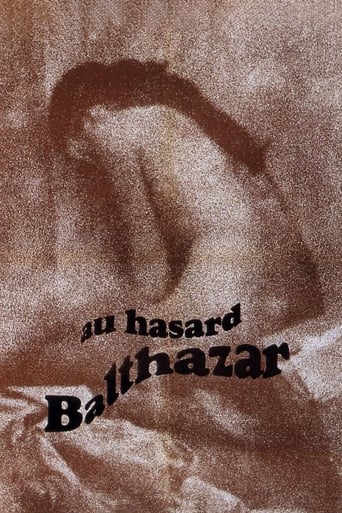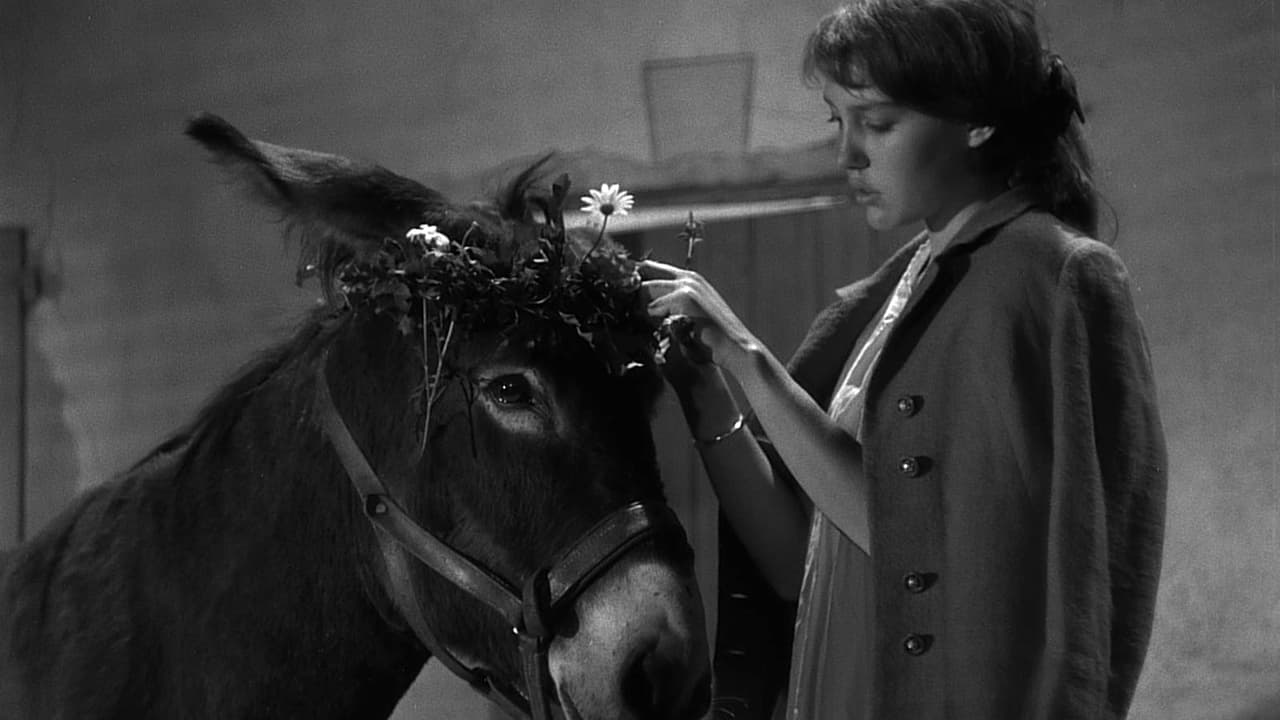Vonia
Au Hasard Balthazar (French) (1966) Adorable self-abnegating donkey that serves as a symbol to mankind's hardships,
Paralleling acquiescent Marie's coming-of-age with abusive and delinquent lover Gérard,
But with Bresson's dedication to no acting or emoting,
Without really seeing the significance as a religious parable,
Ultimately an overrated solemn ode to Christianity, nature, life and death. Gogyohka translates literally to "five-line poem." An alternative to the tanka form, the gogyohka has very simple rules. Five lines with one phrase per line. What comprises a phrase? Eye of the beholder- or the poet, in this case.
#Gogyohka #PoemReview
Howard Schumann
In Balthazar, a donkey is a silent witness to the cruelty and indifference of human beings as he is passed from one owner to the other. Suffering is his lot in life, a suffering that is mirrored in the life of his original owner, young Marie, whose innocence is trampled on and abused by a young man to whom she has given herself unselfishly.It is from that suffering, however, that grace is revealed and shown without adornment in a concluding scene of simple, yet profound beauty. Bresson himself describes this most eloquently: ". . . the more life is what it is - ordinary, simple, without pronouncing the word 'God' - the more I see the presence of God in that." To Bresson, sainthood is available to all, even to the most debased creatures.
TheFamilyBerzurcher
Faith has been made complicated in the 21st Century. It is economic. It is sociological. It is classist. Above all, it is politicized. Christ's message has been manipulated and warped so that people can justify hate with His words. Mention of the Republican party or the Right will undoubtedly conjure images of frenzied worshipers, people shouting in tongues, and probably Rick Santorum. How many votes in this election will be made with a spiritual basis? Belief has been exorcised from political discourse. It's like your "personal life," something you leave behind when going to work. For many, Christianity has been made a joke - a punchline that everyone knows will never land.It's mental segregation. A religious conviction has been made into shorthand for particular socioeconomic ideas. And wrongly so. Educated liberals offer factual objections to the most basic assumptions in the Holy Bible. In fact, the simple virtue of education has been politicized as well. Believing in a God is now associated with being stupid or uneducated.All of this is equally upsetting. It makes AU HASARD BALTHAZAR so vital.The Christ imagery is not hard to see. BALTHAZAR is about the eponymous donkey and his struggles. It is a touching arrangement of image after image, sound and story. Bresson was a French Catholic and, like those of us with a strong faith, couldn't leave his convictions at home. In art, this fact somehow becomes a virtue again.Bresson's tale is full of impeccable photography and a tremendous script. The pictures are so astoundingly crisp and focused that Bresson teaches us where to look with less labor than Hollywood is every able. It's so subtle, but we have been trained to lie with depth, especially now as we are dancing with three dimensions. He famously said that the only way to photograph was from close and in front. At times, this consistency is redundant, not beautiful, but only when employed in rapidly edited passages. Most of the time, however, his photography is sublime - perhaps more evocative of the Italian school than other contemporary French work. In addition, there is a magnificent script, spending a gorgeous majority in silence, respecting the potential of the image. It owes equally to the formality of mass and the subdued ecstasy in Dostoyevsky.So many remark on Bresson's radiant visual style, but he also makes thoughtful use of sound. Some noises, like a cricket or a creaky wheel will gradually migrate from peripheral to dominating. He constructs these tableaux in layers, but unimposing ones. They are simple, but never insulting. His discipline informs the counterpoint rather than eliminating it.A difficult film, but entirely rewarding. Don't ignore the religious imagery and symbolism. Instead, appreciate the intimacy between Bresson and his material.93.3
Jackson Booth-Millard
When I read about this French/Swedish film, that featured in the book 1001 Movies You Must See Before You Die, I assumed from the description it would be like a War Horse style movie, only with no war and stuff, but it turned out to be nothing like that, LOL, from director Robert Bresson. Basically this film follows the life of a donkey named Balthazar, as he grows up and passes from owner to owner, all treating them differently, either with kindness or cruelty, and making him go through happiness and sadness. Throughout the film Balthazar is surrounded by loving children, beaten by the lover of his owner, forced into carrying heavy and painful loads, until he finds peace with nice people and dies a natural death. Starring Anne Wiazemsky as Marie, François Lafarge as Gérard, Philippe Asselin as Marie's father, Nathalie Joyaut as Marie's mother, Walter Green as Jacques, Jean-Claude Guilbert as Arnold the tramp, Pierre Klossowski as Merchant, Jean Rémignard as Notary, Jacques Sorbets as Police Officer/Captain, Tord Paag as Louis, François Sullerot as Baker and Marie-Claire Fremont as Baker's wife. The performances of the film are fine, but the obvious creature that steals the show is the cute donkey who lights up the screen in all his scenes, good and bad, I will admit I did not pay the fullest attention to what was going on, but I suppose it is a drama to see. Very good!


 AD
AD



